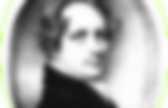

Letter, 1834. (Archival material, 1834. 43 U.S. 653. « up 2 How. 653 11 L.Ed. 416 WILLIAM R.
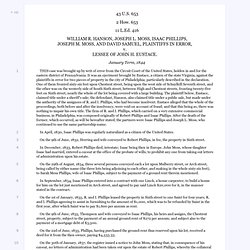
HANSON, JOSEPH L. The History of Foreign Investment in the United States to 1914 - Mira Wilkins. GREAT KLEPTASTROPHES - Part I - The Panic of I837. Andrew Jackson and Horse Racing in Early America. Although organized horse racing began in America in the northeastern section, it shifted south towards the end of the 18th century.
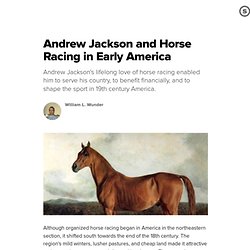
The region's mild winters, lusher pastures, and cheap land made it attractive to the sport's patrons, especially wealthy planters. The sport also attracted a poor boy from the Carolina Piedmont country by the name of Andrew Jackson. Natchez, Mississippi As a boy, Jackson raced horses against other boys in Waxhaw, SC. His racing ability led to his selection as a courier for Patriot forces during the American Revolutionary War. Jackson's youthful fervor continued in Natchez, MS while he built a law career in Nashville, TN.
Truxton But it was Tennessee that would become the center of horse racing in early 19th century America. Jackson fiercely protected this reputation. Bolivar. The Tariff Issue of 1824. Henry Clay, part of the senatorial triumvirate that included Daniel Webster and John C.
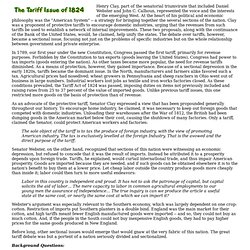
Henry Clay and the "Bank Wars" < Andrew Jackson 1767-1845 A brief biography < Biographies. Clay considered the bank issue, if it could be made an issue, to be in his favor.
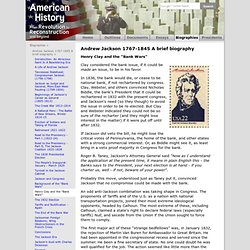
In 1836, the bank would die, or cease to be national bank, if not rechartered by congress. Clay, Webster, and others convinced Nicholas Biddle, the bank's President that it could be rechartered in 1832 with the present congress, and Jackson's need (so they though) to avoid the issue in order to be re-elected. But Clay and Webster indicated they could not be so sure of the recharter (and they might lose interest in the matter) if it were put off until after 1832. The life and speeches of Henry Clay - Henry Clay. Another Twist on the Jacksonian Bank War – Part 1. ©1997 by Gerry Rough <politico8@maplenet.net> This is the first of a three-part series on the claims of the conspiracy theorists regarding the second Bank of the United States.
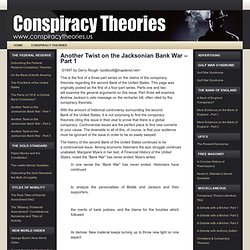
This page was originally posted as the first of a four-part series. Parts one and two will examine the general arguments on this issue. Documentary: Rothschild the 8th Beast Started the American Civil War. The New Alchemy, A Tale of Three Banks excerpted from the book The Creature from Jekyll Island a second look at the Federal Reserve by G. Edward Griffin. The New Alchemy, A Tale of Three Banks excerpted from the book The Creature from Jekyll Island a second look at the Federal Reserve.
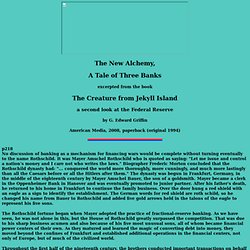
Eustace Mullins On Rothschild Warmongering. The Rothschild Dynasty. The Great Red Dragon - Foreign Money Power In The United States. "The Housing Crash... of 1837" "What has been, what ever must be, the consequence of such a sudden and prodigious inflation of the currency?
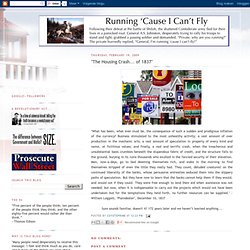
Business stimulated to the most unhealthy activity; a vast amount of over production in the mechanic arts; a vast amount of speculation in property of every kind and name, at fictitious values; and finally, a vast and terrific crash, when the treacherous and unsubstantial basis crumbles beneath the stupendous fabric of credit, and the structure falls to the ground, burying in its ruins thousands who exulted in the fancied security of their elevation. Men, now-a-days, go to bed deeming themselves rich, and wake in the morning to find themselves stripped of even the little they really had.
They count, deluded creatures! On the continued liberality of the banks, whose persuasive entreaties seduced them into the slippery paths of speculation. Henry Clay's opinion of the Bank of the United States from 1832. 1837: Anatomy of a Panic - Jessica M. Lepler. Slave agriculture and financial markets in antebellum America: the Bank of ... - Richard Holcombe Kilbourne. Masters of the Big House: Elite Slaveholders of the Mid-Nineteenth-Century South - William Kauffman Scarborough. Three Roads to the Alamo - William C. Davis. A Guide to the James Campbell Wilkins Papers, 1801-1852. A Guide to the James Campbell Wilkins Papers, 1801-1852 Biographical Note Natchez, Mississippi, cotton planter, merchant, cotton factor, financier, and banker.
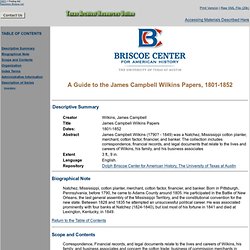
Born in Pittsburgh, Pennsylvania, before 1790, he came to Adams County around 1805. He participated in the Battle of New Orleans, the last general assembly of the Mississippi Territory, and the constitutional convention for the new state. Our Crowd: The Great Jewish Families of New York - Stephen Birmingham. 6. The American House. ROTHSCHILD influence in the United States of America is of very long standing, but there is no reason to believe the story that the Jew Haym Solomon who helped to finance the War of Independence was an agent of the family, as he died in 1785, before Amschel Rothschild became an international financier.
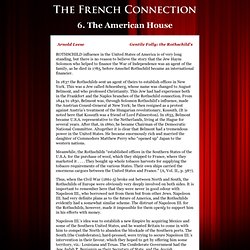
In 1837 the Rothschilds sent an agent of theirs to establish offices in New York. This was a Jew called Schoenberg, whose name was changed to August Belmont, and who professed Christianity. This Jew had had experience both in the Frankfort and the Naples branches of the Rothschild connection. From 1844 to 1850, Belmont was, through Solomon Rothschild’s influence, made the Austrian Consul-General at New York; he then resigned as a protest against Austria’s treatment of the Hungarian revolutionary, Kossuth.
ROTHSCHILD & AMERICA ...MUST READ! Cont ...

DESCENT INTO SLAVERY It would be extraordinarily naive to even consider the possibility that a family as ambitious, as cunning and as monopolistically minded as the Rothschilds could resist the temptation of becoming heavily involved on the American front. Following their conquest of Europe early in the 1800s, the Rothschilds cast their covetous eyes on the most precious gem of them all -- the United States.
America was unique in modern history. Bank of the United States ...: Report[s, and Documents - United States. Congress. House. Committee to Investigate the Bank of the United States, Augustin Smith Clayton, George McDuffie, Israel Thorndike Pamphlet Collection (Library of Congress) Nicholas Biddle letter to Henry Clay, 1 August 1832. Henry Clay letter to Nicholas Biddle, 15 December 1831. Nothing Learned in 300 Years - Bernie Madoff, John Law, the South Sea Bubble, Etc. Why The United States Bank Was Closed, by Andrew Jackson.
Why The United States Bank Was Closed President Andrew Jackson July 10, 1832 A BANK of the United States is in many respects convenient for the Government and useful to the people. Toxic Debt, Liar Loans, and Securitized Human Beings. Edward E. BaptistToxic Debt, Liar Loans, and Securitized Human Beings The Panic of 1837 and the fate of slavery Early in the last decade, an Ayn Rand disciple named Alan Greenspan, who had been trusted with the U.S. government's powers for regulating the financial economy, stated his faith in the ability of that economy to maintain its own stability: "Recent regulatory reform coupled with innovative technologies has spawned rapidly growing markets for, among other products, asset-backed securities, collateral loan obligations, and credit derivative default swaps.
These increasingly complex financial instruments have contributed, especially over the recent stressful period, to the development of a far more flexible, efficient, and hence resilient financial system than existed just a quarter-century ago. " These versions of the Panic are capsules that carry other versions of the history of American capitalism into the bloodstream of historical consciousness. Bank War in the Jacksonian Age: Andrew Jackson, Nicholas Biddle, and the Battle over the B.U.S. The second Bank of the United States, established in 1816, was a mixed private/public institution with far reaching influence:Held the U.S. Treasury's tax receipts on deposit.Handled U.S. government's transactions.Issued its own paper currency, which was legal tender.Made loans to other banks, businesses, and individuals.Marketed the Treasury's securities around the world.Presented the paper of state banks for redemption.Expanded and contracted money supply.Biddle, president of the BUS since 1823, had effectively managed the bank, which was partially responsible for the good economy when Jackson became president in 1829.
However, storm clouds had arisen: the bank's charter was to expire in 1836, and the anti-bank Jackson hovered ominously. Recharter Veto Jackson distrusted banks. Is Bernanke Channeling Nicholas Biddle? When the Federal Reserve began its quantitative easing program (QE2) earlier this month, it did not anticipate the subsequent firestorm of criticism. Foreign government officials, esteemed economists, and members of congress among others have complained that the Fed is "printing money" and "debasing the currency". Even Sarah Palin is making a lot of noise about it.
Admittedly the optics look bad. The Fed will buy $600 billion of Treasury bonds through June of next year, which is just about what the Treasury will issue to fund the budget deficit. The bank of the united states - Andrew Jackson - war, election, second. Jackson's style of reaching out for political issues was never better illustrated than his attack on the Second Bank of the United States. The bank had been chartered in 1816 to restore the country to a sound fiscal condition after near financial catastrophe during the War of 1812. It was a large corporation, managed and operated under both private and public auspices.
PRESIDENT ANDREW JACKSON. Read Jackson Versus Biddle: The Struggle over the Second Bank of the United States by Andrew Jackson, Ralph C. H. Catterall, Bray Hammond. Exhibits - Checks & Balances - Andrew Jackson - Andrew Jackson - Museum of American Finance. Toxic Debt, Liar Loans, and Securitized Human Beings. Federal Reserve 1. Did the Panic of 1837 Affect the Demise of the Kirtland Safety Society? - Believe All Things. Panic of 1837. Causes[edit] The crisis was due to a period of economic expansion from mid-1834 to mid-1836. The prices of land, cotton, and slaves rose sharply in these years. The origins of this boom had many causes, both domestic and international. Because of the peculiar factors of international trade at the time, abundant amounts of silver were coming into the United States from Mexico and China. Land sales and tariffs on imports were also generating substantial federal revenues.
In 1836, directors of the Bank of England noticed that the Bank's monetary reserves had declined precipitously in recent years, possibly because of poor wheat harvests that forced Great Britain to import much of its food. When New York banks raised interest rates and scaled back on lending, the effects were damaging. Americans at the time attributed the cause of the panic principally to domestic political conflicts.
Effects and aftermath[edit] See also[edit] References[edit] Jump up ^ Timberlake, Jr., Richard H. (1997). Economic déjà vu. Scott Nelson’s book looks at strangely familiar financial landscapes. For Alan Greenspan, the market turmoil is deja vu all over again.